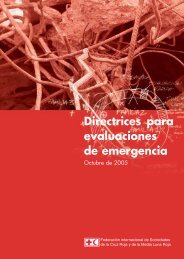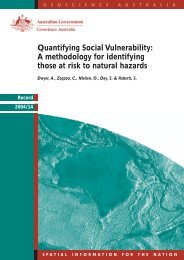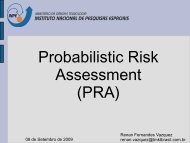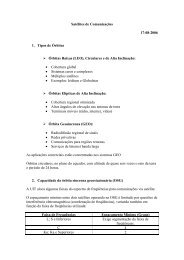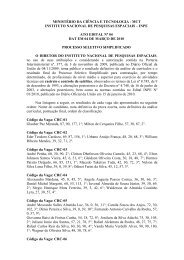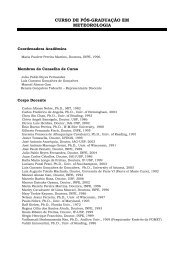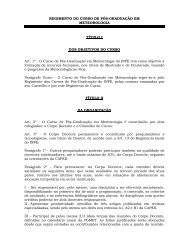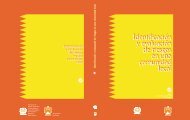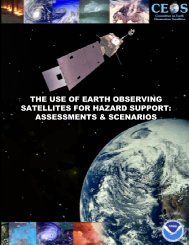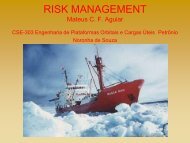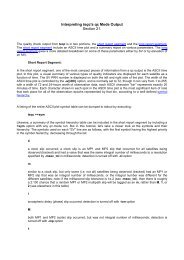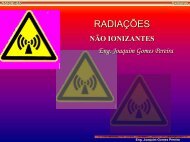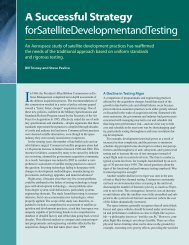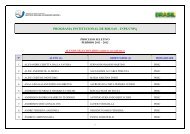Living with Risk. A global review of disaster reduction initiatives
Living with Risk. A global review of disaster reduction initiatives
Living with Risk. A global review of disaster reduction initiatives
Create successful ePaper yourself
Turn your PDF publications into a flip-book with our unique Google optimized e-Paper software.
6<br />
<strong>Living</strong> <strong>with</strong> <strong>Risk</strong>: A <strong>global</strong> <strong>review</strong> <strong>of</strong> <strong>disaster</strong> <strong>reduction</strong> <strong>initiatives</strong><br />
Principal organs <strong>of</strong> the United Nations System concerned <strong>with</strong> <strong>disaster</strong> and risk <strong>reduction</strong><br />
General Assembly<br />
The General Assembly is the main deliberative<br />
organ <strong>of</strong> the United Nations and is composed<br />
<strong>of</strong> representatives <strong>of</strong> all Member States. While<br />
the decisions <strong>of</strong> the Assembly expressed in resolutions<br />
have no legally binding force for<br />
Governments, they carry the weight <strong>of</strong> world<br />
opinion as well as the moral authority <strong>of</strong> the<br />
world community. Decisions <strong>of</strong> the Assembly<br />
are based on documentation produced at its<br />
request on reports from United Nations organs<br />
(i.e. Secretary-General's reports, reports from<br />
United Nations conferences). Non-United<br />
Nations entities are widely consulted for the<br />
drafting <strong>of</strong> these reports, which therefore<br />
include an overview <strong>of</strong> issues at stake. The<br />
Assembly's awareness <strong>of</strong> the necessity to reduce<br />
the impact <strong>of</strong> <strong>disaster</strong>s began in 1971 when it<br />
adopted a resolution for the creation <strong>of</strong> the<br />
Office <strong>of</strong> the United Nations Disaster Relief Coordinator<br />
(UNDRO) for the improved coordination<br />
<strong>of</strong> "assistance in cases <strong>of</strong> natural <strong>disaster</strong><br />
and other <strong>disaster</strong> situations", including <strong>disaster</strong><br />
mitigation. In 1988 the Assembly endorsed the<br />
establishment <strong>of</strong> a Disaster Management Training<br />
Programme (DMTP), recommending the<br />
upgrading <strong>of</strong> pr<strong>of</strong>essional skills in <strong>disaster</strong><br />
management through inter-agency training<br />
programmes under the joint management <strong>of</strong> the<br />
United Nations Development Programme<br />
(UNDP) and UNDRO. The Assembly<br />
recognized the need to focus on <strong>disaster</strong> <strong>reduction</strong><br />
as an activity in itself in 1987 and launched<br />
the International Decade for Natural Disaster<br />
Reduction in 1989 followed by ISDR in 1999.<br />
Resolutions were also passed on the need for<br />
cooperation to reduce the impact <strong>of</strong> the El<br />
Niño phenomenon (from 1997) and on early<br />
warning capacities <strong>of</strong> the United Nations<br />
system <strong>with</strong> regard to natural <strong>disaster</strong>s (from<br />
1994). Disaster <strong>reduction</strong> is generally<br />
discussed under the segment Environment and<br />
Sustainable Development in the Second<br />
Committee <strong>of</strong> the General Assembly. The<br />
Humanitarian segment <strong>of</strong> the Assembly might<br />
touch upon the subject when related to humanitarian<br />
issues ("relief to development" is<br />
discussed in the Third Committee).<br />
Web site: www.un.org/ga/56/<br />
Economic and Social Council<br />
The Economic and Social Council is the principal organ<br />
coordinating the economic, social and related work <strong>of</strong><br />
the United Nations and has 54 members, elected for<br />
three-year terms by the General Assembly. The Council<br />
cooperates <strong>with</strong>, and to a certain extent also coordinates,<br />
the work <strong>of</strong> United Nations programmes (such as Unted<br />
Nations Development Programme (UNDP), the United<br />
Nations Environment Programme (UNEP) and the United<br />
Nations Children's Fund (UNICEF)) and the specialized<br />
agencies (such as Food and Agriculture Organization<br />
(FAO), the International Labour Organization (ILO), the<br />
United Nations Educational, Scientific and Cultural Organization<br />
(UNESCO) and the World Health Organization<br />
(WHO), all <strong>of</strong> which report to the Council. The United<br />
Nations, and the Economic and Social Council in<br />
particular, are increasingly considering non-governmental<br />
organizations (NGOs), including academic institutions,<br />
private sector and other stakeholders, as partners and<br />
valuable links to civil society. The Council has long since<br />
recognized that the promotion <strong>of</strong> economic growth and<br />
sustainable development cannot be achieved <strong>with</strong>out<br />
adequate measures to prevent and reduce the impact <strong>of</strong><br />
natural <strong>disaster</strong>s. It has also consistently called for a<br />
coordinated approach to <strong>disaster</strong> <strong>reduction</strong> <strong>with</strong>in and<br />
outside the United Nations system. Decisions and resolutions<br />
<strong>of</strong> the Council include recommendations to the<br />
General Assembly on supporting efforts for the good<br />
functioning <strong>of</strong> IDNDR and later on ISDR as well as on<br />
issues such as early warning and the El Niño phenomenon.<br />
Nine functional commissions and five regional commissions<br />
are part <strong>of</strong> the Council's so-called machinery that<br />
carries out its work. The functional commissions, serviced<br />
by the United Nations Secretariat, are deliberative<br />
bodies whose role is to consider and make recommendations<br />
on issues in their areas <strong>of</strong> responsibility and<br />
expertise. Two commissions are particularly relevant to<br />
<strong>disaster</strong> <strong>reduction</strong>: the Commission on Sustainable<br />
Development (CSD) and the Commission on the Status<br />
<strong>of</strong> Women (CSW).<br />
Division for ECOSOC Support and<br />
Coordination<br />
Department <strong>of</strong> Economic and Social Affairs<br />
1 UN Plaza, Room DC1-1428<br />
New York, NY 10017, United States<br />
E-mail: esa@un.org<br />
Web site: www.un.org/esa/coordination/desc.htm<br />
302



